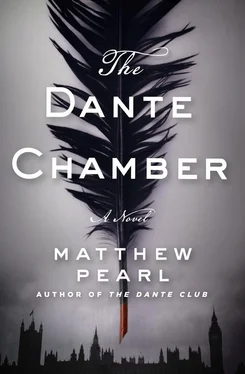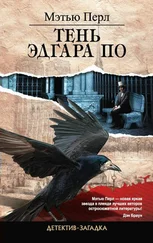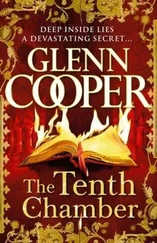“Madness, to some, this mysterium magnum ,” mused the Dante Master on this topic, his lips making a popping sound as though to mock and belittle the doubters. “To others: the truth as yet unsketched by any philosopher.”
Sibbie had found meaning and purpose that no reading of the Bible, however passionate, no preacher or spiritualist or magical healer, had ever shown her.
“‘Behold I am, truly I am Beatrice,’” Sibbie read aloud from Purgatory , as though taking an oath. At the prompting of their mysterious instructor in Italy, she read the words again. Behold I am, truly I am Beatrice.
Repeat the words to yourself each day, he told her, seven times a day.
While the visitors were touring the homes and haunts of Dante and related locations, they found themselves at one point caught in a crushing crowd in Rome. Fallow began to panic. He shook, he cried. He felt he was about to burst out of his skin. But Sibbie, turning her ability onto the man who was ostensibly her superior, put her hands on his shoulders, her fingers moving like giant spiders up his neck. Against all logic this calmed him, and suddenly he could breathe.
From that moment on, Fallow was beholden to her. He increasingly served Sibbie’s wishes, rather than the other way around, even when to the outside world she still appeared to be laboring as an assistant. He pledged himself to her.
After Sibbie returned to England, she directed the preacher to assist her in finding those who would help her enact the vision and prophecy of Dante. Around this time, as their Phillip Sanatorium began to be organized, the preacher was called to assist in an exhumation of a body in order to retrieve a bundle of poems heavily influenced by Dante — and in doing so became acquainted with the troubled and brilliant Dante Gabriel Rossetti, son of the very scholar whose cult of Dante had mesmerized them. Sibbie, intent on including Mr. Rossetti in her mission, went to find the painter-poet.
Reader, it may be useful to describe further the woman so many, yourselves included, have worshipped or will worship for years to come. She is striking. Her excellent, piercing blue eyes burn through to the soul — examine one of the photographs of her reproduced here, notice those eyes possess a glow with a light when captured by a camera. People who were near her — couldn’t help themselves — wished she would look at them, and then wished she might stop. Just as when she looked upon the sacrifice of Brother Morton, she stands strong, long limbed, her hair the color of sunlight. Or, I should correct myself — her hair was so until recently when, under necessity to conceal herself from police attempting to interfere with her mission, she temporarily dyed her hair the dull color of a walnut, and later cut short and as black as ink. But her physical appearance is a modest hint of the inner strength and force that comes out in even the briefest encounter with this woman.
Mr. Rossetti, some say, nearly collapsed upon seeing her at the gates of the Highgate Cemetery after the unearthing of his wife, feeling the stranger’s power immediately as sensitive and artistic souls do; soon the brilliant man as well as a number of Sibbie’s other new devotees were collected on the grounds of the sanatorium, some moving back and forth between there and London and others residing there, seeming to have vanished from their previous lives in the eyes of outsiders. All the devotees, it is fair to say, needed Dante Alighieri to set their lives on the divine course and, perhaps even more, they needed Sibbie.
It had been a copper-skied evening in early October 1869. Gabriel could not stop his hands from shaking. The book pirate, Whiskey Bill, and the sexton of the cemetery had finally reached the coffin seven feet under the ground, and were disinterring it by the light of a large fire. Gabriel did not help. He could not help. Because of his trembling, but more so because of what he was doing. What vanity had it been, to think that the poems he had interred with his wife were worth disrupting her eternal peace — and his.
But he wanted those poems. He had a right to the product of his own genius, hadn’t he?
Gabriel turned to look at the next grave, his father’s. He had hazy recollections of the day the old man died. Deprived of his sight, writhing in pain, he had been speaking nonsense. “Where is my mother? She was right next to me a moment ago,” the professore moaned at one point.
His mind seemed to grow clear for short periods of time.
“What a consolation it is to have all my children around me! And yet not to be able to see them.” Then, to Gabriel: “ Ingegnoso Gabriel. What mistakes I made. You are like a sheep running amok, full of genius but too lazy and disrespectful to be a Dante!”
Christina and their mother soothed Gabriel and promised him the professore did not know what he was saying. Soon, the old man cried out, “ Ah Dio, ajutami tu ” — Oh God, help me — and was gone.
A sheep running amok .
“Here’s the thing .” The words seeped out of the toothy grin of Whiskey Bill. The redheaded book pirate was holding the manuscript of poems. “Ah, don’t touch yet, Rossetti,” he said to the eager Gabriel, “we must dry it by the fire and so on.”
As the book pirate and a doctor began to treat the worm-eaten manuscript — the pages resurrected from death — with disinfectants, the religious observer — for one was required by their arrangements with the city — walked over to Gabriel, who was preparing himself.
“You’re not going to look into the grave, Mr. Rossetti?” asked Reverend Fallow, noticing the intense anticipation of Gabriel’s face.
The cool wind blew, and an eddy of sparks flew toward Gabriel and the preacher.
“Yes,” Gabriel replied.
“Perhaps I wouldn’t, Mr. Rossetti.”
“I was assured she would be in fine condition.” He hesitated, then asked, “Is she, Reverend? Is she?”
Whiskey Bill read aloud a poem about Dante Alighieri — maybe about Gabriel’s father the professore, as well — which Gabriel had called “Dantis Tenebræ,” from one of the pages he was drying.
This is that steep land
Where he that holds his journey stands at gaze
Tow’rd sunset, when the clouds like a new height
Seem piled to climb. These things I understand:
For here, where day still soothes my lifted face,
On thy bowed head, my father, fell the night.
Fallow’s mouth lifted into a pacifying smile. “Of course she is in excellent condition. Her hair continued to grow after death, it seems, and fills the coffin like a bed of roses. But do you not wish to remember her in life, rather than in death?”
“Please understand, Reverend, that I had no intention of disturbing her peace today, I merely... I tried so hard to remember my verses exactly as I wrote them, but I couldn’t. Even though I wrote them, they were not mine, not anymore. You see, my last volume of verse was hated by some of the bloody critics who say I must choose to be either painter or poet, but these, these will set them all right again.” Tears welled up in Gabriel’s eyes. “I must see her.”
He knew. He knew they were all lying about her being in such splendid, lifelike condition. The body down there was not Lizzie anymore. It was a ghoul, a monster who would never again let Gabriel rest.
Murderer .
Reverend Fallow gripped Gabriel’s arm as tightly as he could.
“Let go of me! Let me see her!”
“Something else may have pulled you back here,” Fallow said with a peculiar air. “Dante. That is what is contained in many of those poems, isn’t it? Your visions of Dante Alighieri.”
Читать дальше












